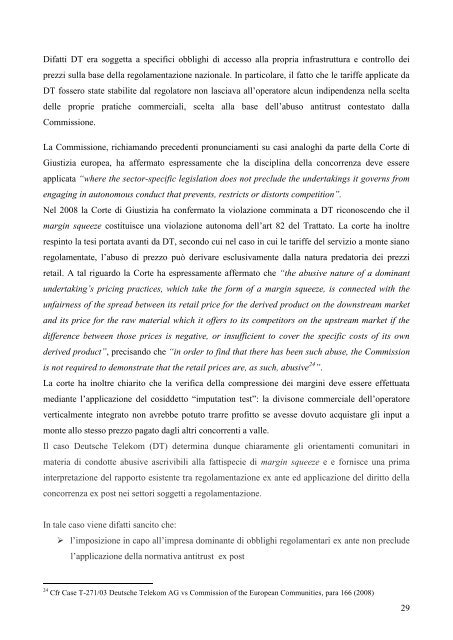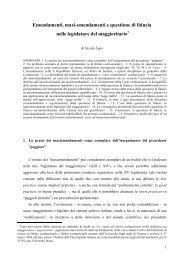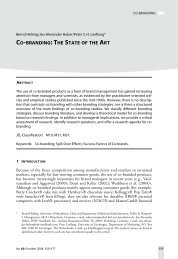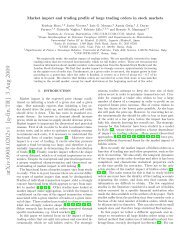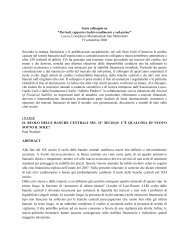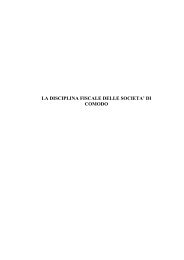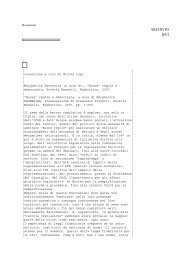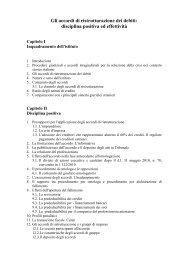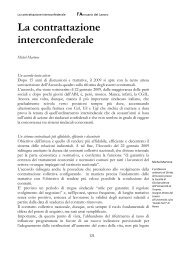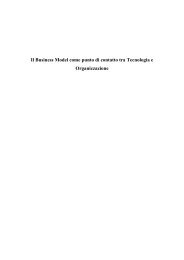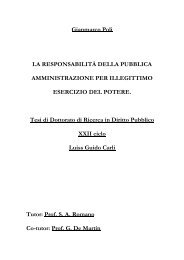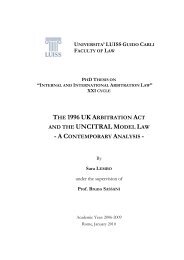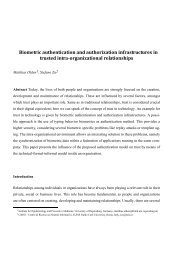The rebates, which consist in granting a lump sum discount to the ...
The rebates, which consist in granting a lump sum discount to the ...
The rebates, which consist in granting a lump sum discount to the ...
Create successful ePaper yourself
Turn your PDF publications into a flip-book with our unique Google optimized e-Paper software.
Difatti DT era soggetta a specifici obblighi di accesso alla propria <strong>in</strong>frastruttura e controllo deiprezzi sulla base della regolamentazione nazionale. In particolare, il fat<strong>to</strong> che le tariffe applicate daDT fossero state stabilite dal regola<strong>to</strong>re non lasciava all’opera<strong>to</strong>re alcun <strong>in</strong>dipendenza nella sceltadelle proprie pratiche commerciali, scelta alla base dell’abuso antitrust contesta<strong>to</strong> dallaCommissione.La Commissione, richiamando precedenti pronunciamenti su casi analoghi da parte della Corte diGiustizia europea, ha afferma<strong>to</strong> espressamente che la discipl<strong>in</strong>a della concorrenza deve essereapplicata “where <strong>the</strong> sec<strong>to</strong>r-specific legislation does not preclude <strong>the</strong> undertak<strong>in</strong>gs it governs fromengag<strong>in</strong>g <strong>in</strong> au<strong>to</strong>nomous conduct that prevents, restricts or dis<strong>to</strong>rts competition”.Nel 2008 la Corte di Giustizia ha conferma<strong>to</strong> la violazione comm<strong>in</strong>ata a DT riconoscendo che ilmarg<strong>in</strong> squeeze costituisce una violazione au<strong>to</strong>noma dell’art 82 del Tratta<strong>to</strong>. La corte ha <strong>in</strong>oltreresp<strong>in</strong><strong>to</strong> la tesi portata avanti da DT, secondo cui nel caso <strong>in</strong> cui le tariffe del servizio a monte sianoregolamentate, l’abuso di prezzo può derivare esclusivamente dalla natura preda<strong>to</strong>ria dei prezziretail. A tal riguardo la Corte ha espressamente afferma<strong>to</strong> che “<strong>the</strong> abusive nature of a dom<strong>in</strong>antundertak<strong>in</strong>g’s pric<strong>in</strong>g practices, <strong>which</strong> take <strong>the</strong> form of a marg<strong>in</strong> squeeze, is connected with <strong>the</strong>unfairness of <strong>the</strong> spread between its retail price for <strong>the</strong> derived product on <strong>the</strong> downstream marketand its price for <strong>the</strong> raw material <strong>which</strong> it offers <strong>to</strong> its competi<strong>to</strong>rs on <strong>the</strong> upstream market if <strong>the</strong>difference between those prices is negative, or <strong>in</strong>sufficient <strong>to</strong> cover <strong>the</strong> specific costs of its ownderived product”, precisando che “<strong>in</strong> order <strong>to</strong> f<strong>in</strong>d that <strong>the</strong>re has been such abuse, <strong>the</strong> Commissionis not required <strong>to</strong> demonstrate that <strong>the</strong> retail prices are, as such, abusive 24 ”.La corte ha <strong>in</strong>oltre chiari<strong>to</strong> che la verifica della compressione dei marg<strong>in</strong>i deve essere effettuatamediante l’applicazione del cosiddet<strong>to</strong> “imputation test”: la divisone commerciale dell’opera<strong>to</strong>reverticalmente <strong>in</strong>tegra<strong>to</strong> non avrebbe potu<strong>to</strong> trarre profit<strong>to</strong> se avesse dovu<strong>to</strong> acquistare gli <strong>in</strong>put amonte allo stesso prezzo paga<strong>to</strong> dagli altri concorrenti a valle.Il caso Deutsche Telekom (DT) determ<strong>in</strong>a dunque chiaramente gli orientamenti comunitari <strong>in</strong>materia di condotte abusive ascrivibili alla fattispecie di marg<strong>in</strong> squeeze e e fornisce una prima<strong>in</strong>terpretazione del rappor<strong>to</strong> esistente tra regolamentazione ex ante ed applicazione del dirit<strong>to</strong> dellaconcorrenza ex post nei set<strong>to</strong>ri soggetti a regolamentazione.In tale caso viene difatti sanci<strong>to</strong> che:‣ l’imposizione <strong>in</strong> capo all’impresa dom<strong>in</strong>ante di obblighi regolamentari ex ante non precludel’applicazione della normativa antitrust ex post24 Cfr Case T-271/03 Deutsche Telekom AG vs Commission of <strong>the</strong> European Communities, para 166 (2008)29


